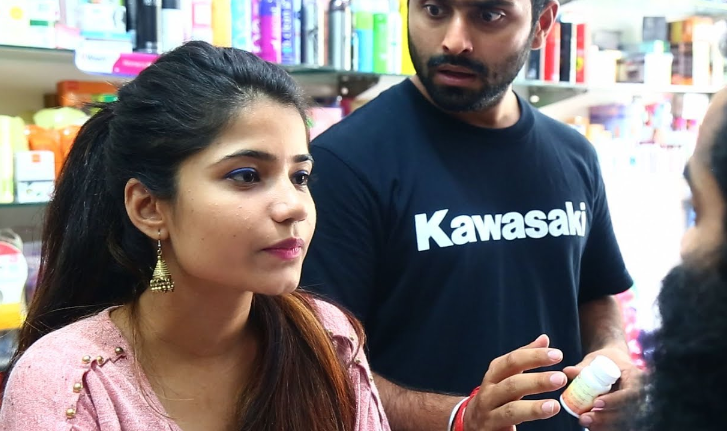Buying condoms can be seen as the man's job. It goes on him, after all, and
a man taking responsibility for contraception can't be a bad thing, right?
But establishing men as the partner with primary
contraceptive responsibility can actually perpetuate deep-seated stigmas for
women, especially when it comes to sexuality. These stigmas have led to many
women being embarrassed to grab a pack from store shelves,
worried their actions will be perceived as slutty or overeager.
The questioning eyes of the chemist make her postulate how she will talk him into using condoms next time, a tall tale but girls’ got to do what a girls’ got to do. She thinks she is the only woman in his life and even if he does not glove it, she’s safe...another educated illiterate.
Surprisingly women are not the only culprits, some of these men do not know how to glove it.
Now what made me write this?
I was recently given the assignment to conduct a social experiment on the reception of chemists to their contraceptive clientele. Well, I’m lying, I just have to use euphemism or socially accepted words to decorate the fact that we have sex but we fear people’s perception.
I went to the chemist to get condoms, and tactlessly I made my order. A crowd had formed and, being a loud-mouthed I asked the chemist what condoms he had. Then there was silence in the room, and everyone gave me that ‘ You don't even have shame’ look but if you know Marcy too well, you most definitely know I hardly give the audience to people’s misinterpreted perception about me.
The guy serving me literally had to conceal the condoms as he packed them, he took a brown bag wrapped them hurriedly, and gave them to me. I walked out of the chemist amid questioning stares.
From a survey conducted by the World Health Organization(WHO) women are at a higher risk of contracting the much dreaded HIV virus compared to men. Women also lead in the numbers of those infected by the virus.
Why? Yet a lot of sexual education has been done, we have even been taught to wear female condoms in most public forums but still, yours truly has no idea of how to even use it.
Women have been empowered enough to unchain themselves from backward stereotypes.
BUYING CONDOMS IS NOT A MAN’S JOB — IT’S EVERYONE’S
When I first became sexually active, I never bought my own condoms. I had this preconceived notion that the male partner in a relationship was the one responsible for buying condoms. It also did not help that I lived in a very rural town in northwest Kansas where the local grocery store did not sell condoms, never mind emergency contraception or pregnancy tests.
Looking back now, I realize that my belief about who buys
condoms was a byproduct of a higher social norm for relationships: the man is
in charge. The man is supposed to make the first move, ask the girl on their
first date, and initiate sex. Since men are the ones expected to initiate the
sexual part of the relationship, they supply condoms.
And in a way, that makes sense; though female condoms are
available, male
condoms are the most widely used. Since the condom goes on a penis,
shouldn’t the person with a penis buy them?
However, this train of thought hindered me. I was totally
capable of buying protection for myself and my partner, but we both assumed
that it was his responsibility to do so. This notion that men have to buy and
supply condoms for their sexual relationships can affect those relationships
negatively and give women less authority over their sexual preferences and
habits. I believe that gendered expectations for men can affect people in
same-sex relationships, too.
It’s important to know that any person engaging in sexual
activity can buy their own condoms, no matter what their identity is or who
they are having sex with. This is important, especially for women and queer
people who have been left out of the narrative that “the man buys the condoms.”
Condoms are absolutely important; they protect users against
pregnancy and STIs. According to birthcontrol.com,
condoms are 98 percent effective at preventing pregnancy with perfect use.
What is also important about them is that buying them can be
a way of expressing your sexual needs and preferences and taking your choices
into your own hands.
Today, many companies that sell condoms have embraced the dynamic that anyone, not just
men, should buy condoms for themselves. Their brand focuses on
body and sex-positivity for everyone, especially women.
What is also great about these online condom
retailers is that their products are mail-order, so they can be delivered just
about anywhere. I wish I had known about this service when I was younger; I
thought the only places I could buy condoms were in convenience stores and
supermarkets like Walmart. Ordering condoms online is not only a nice
convenience, but it helps expand birth control access to more rural areas.
Let’s normalize the reality that anyone who needs condoms
can get them. It’s not one person’s “job” to make sure they and their
partner(s) are having safe sex. Protecting yourself and your partner(s) is much
more important than protecting gender roles.
